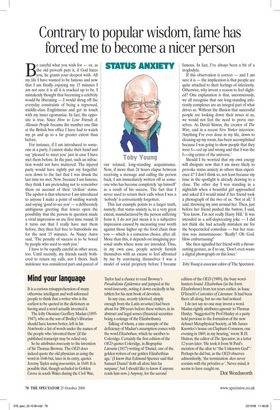Contrary to popular wisdom, fame has forced me to become a nicer person
Be careful what you wish for — or, as the old proverb puts it, if God hates you, he grants your deepest wish. All my life I have wanted to be famous and now that I am finally enjoying my 15 minutes I am not sure it is all it is cracked up to be. I mistakenly thought that becoming a celebrity would be liberating — I would shrug off the everyday constraints of being a repressed, middle-class Englishman and get in touch with my inner egomaniac. In fact, the opposite is true. Since How to Lose Friends & Alienate People became the number one film at the British box office I have had to watch my ps and qs to a far greater extent than before.
For instance, if I am introduced to someone at a party, I cannot shake their hand and say ‘pleased to meet you’ just in case I have met them before. In the past, such an infraction would not have mattered. The injured party would have rightly put my forgetfulness down to the fact that I was drunk the last time we met. Now, because I am famous, they think I am pretending not to remember them on account of their ‘civilian’ status. The upshot is that whenever I am introduced to anyone I make a point of smiling warmly and saying ‘good to see you’ — a deliberately ambiguous greeting that leaves open the possibility that the person in question made a vivid impression on me first time round. If it turns out that I really have met them before, they then feel free to buttonhole me for the next 15 minutes. As Nancy Astor said, ‘The penalty of success is to be bored by people who used to snub you.’ I have to be equally careful in other areas, too. Until recently, my friends rarely bothered to return my calls, nor I theirs. Such indolence was considered part-and-parcel of our relaxed, long-standing acquaintance. Now, if more than 24 hours elapse between receiving a message and calling the person back, I am immediately written off as someone who has become completely ‘up himself’ as a result of his success. The fact that I never used to return their calls when I was a ‘nobody’ is conveniently forgotten.
This last example points to a larger truth, namely, that status anxiety is, to a very great extent, manufactured by the person suffering from it. I do not just mean it is a subjective impression caused by measuring your worth against those higher up the food chain than you — which is a conscious choice, after all. More than this, it depends on imagining personal snubs where none are intended. Thus, in my own case, people actively furnish themselves with an excuse to feel affronted by me by convincing themselves I was a model of social propriety before I became famous. In fact, I’ve always been a bit of a troglodyte.
If this observation is correct — and I am sure it is — the implication is that people are quite attached to their feelings of inferiority. Otherwise, why invent a reason to feel slighted? One explanation is that, unconsciously, we all recognise that our long-standing inferiority complexes are an integral part of what drives us. Without the illusion that successful people are looking down their noses at us, we would not feel the need to prove ourselves. As David Simon, the creator of The Wire, said in a recent New Yorker interview: ‘Anything I’ve ever done in my life, down to cleaning up my room, has been accomplished because I was going to show people that they were f***ed up and wrong and that I was the f***ing centre of the universe.’ Should I be worried that my own energy will dissipate now that I am more likely to provoke status anxiety in others than experience it? I don’t think so, not least because my time in the spotlight is already drawing to a close. The other day I was standing in a nightclub when a beautiful girl approached and asked if I would mind if her friend took a photograph of the two of us. ‘Not at all,’ I said, throwing my arm around her. Then, just before her friend pushed the button, I said, ‘You know, I’m not really Harry Hill.’ It was intended as a self-deprecating joke — I did not think she had actually mistaken me for the bespectacled comedian — but her reaction was instantaneous: ‘Really? Oh God. How embarrassing!’ She then signalled her friend with a throatcutting gesture, as if to say, ‘Don’t even waste a digital photograph on this loser.’


















































































 Previous page
Previous page